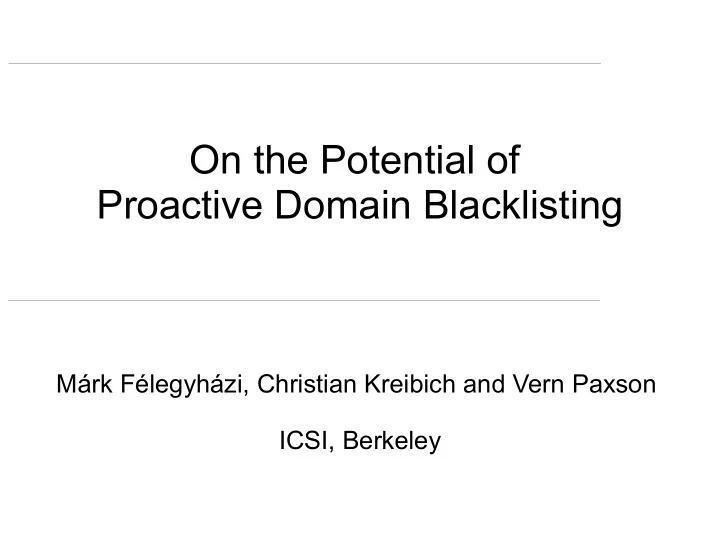

On the Potential of Proactive Domain Blacklisting Márk Félegyházi, Christian Kreibich and Vern Paxson ICSI, Berkeley
Spam domain registrations Kreibich et al., “Spamcraft: An inside look at spam campaign orchestration” LEET 2009 (CCIED: The Collaborative Center for Internet Epidemiology and Defenses) 2
Spam domain registrations domains dropped soon after ● blacklisted Kreibich et al., “Spamcraft: An inside look at spam campaign orchestration” LEET 2009 (CCIED: The Collaborative Center for Internet Epidemiology and Defenses) 3
Spam domain registrations domains dropped soon after ● blacklisted domains registered in batches ● Kreibich et al., “Spamcraft: An inside look at spam campaign orchestration” LEET 2009 (CCIED: The Collaborative Center for Internet Epidemiology and Defenses) 4
Proactive domain clustering 5
Proactive domain clustering 6
Name server features .COM zone file - NS records 7
Name server features .COM zone file - NS records 8
Name server features .COM zone file - NS records 9
Name server features .COM zone file - NS records 10
Name server features .COM zone file - NS records 11
Registration features WHOIS registry records 12
Registration features WHOIS registry records 13
Registration features WHOIS registry records 14
Evaluation 15
Evaluation 16
Evaluation 17
Evaluation 18
Evaluation 19
Prediction accuracy 20
Prediction accuracy good true positive rate, only few false positives ● # of false positives vary across clusters ● – 84% of clusters have no potential FPs (unknown) 21
A note on false positives ● some other clusters (example: 123 domains, 119 FP) – many noun-noun domains 22
A note on false positives ● some other clusters (example: 123 domains, 119 FP) – many noun-noun domains 23
A note on false positives ● some other clusters (example: 123 domains, 119 FP) – many noun-noun domains 24
A note on false positives ● some other clusters (example: 123 domains, 119 FP) – many noun-noun domains 25
A note on false positives ● some other clusters (example: 123 domains, 119 FP) – many noun-noun domains ● large cluster: 1746 domains – part of a set of 80k domains – registered under a single name in Albania in Jan and Feb 2010 26
Time to blacklisting 27
Time to blacklisting 28
Time to blacklisting 29
Summary ● domains registered and used in clusters 30
Summary ● domains registered and used in clusters ● more malicious domains based on a few seeds and domain registry information 31
Summary ● domains registered and used in clusters ● more malicious domains based on a few seeds and domain registry information ● good accuracy – 73% of inferred domains on blacklists – 93% of domains are suspicious – false positives are often true positives 32
Summary ● domains registered and used in clusters ● more malicious domains based on a few seeds and domain registry information ● good accuracy – 73% of inferred domains on blacklists – 93% of domains are suspicious – false positives are often true positives ● faster than blacklists for 92% of the inferred malicious domains 33
Summary ● domains registered and used in clusters ● more malicious domains based on a few seeds and domain registry information ● good accuracy – 73% of inferred domains on blacklists – 93% of domains are suspicious – false positives are often true positives ● faster than blacklists for 92% of the inferred malicious domains early response to spam 34
Spam and click volumes Kanich et al., “Spamalytics: An empirical analysis of spam marketing conversion” CCS 2008 (CCIED: The Collaborative Center for Internet Epidemiology and Defenses) 35
Spam and click volumes Kanich et al., “Spamalytics: An empirical analysis of spam marketing conversion” CCS 2008 (CCIED: The Collaborative Center for Internet Epidemiology and Defenses) 36
Name server ages 37
NS features ● 82.2% of domains encounter fresh name servers 38
Registration clusters 39
McAfee SiteAdvisor 40
Recommend
More recommend